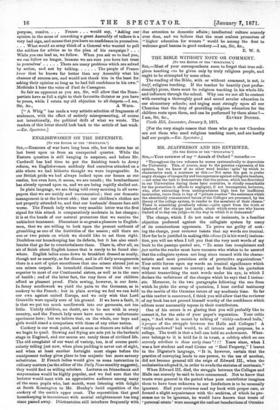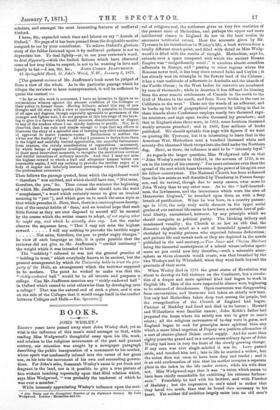MR. JEAFFRESON AND HIS REVIEWER. [TO THE EDITOR OF THE
"SPECTATOR."]
Sin,—Your reviewer of my " Annals of Oxford " remarks:—
" Throughout the two volumes he seems systematically to depreciate the University. This, of course, may be the genuine expression of his opinion, but we know of no other word besides spite' by which to characterize such a sentence as this:—' Not mine the pen to prefer angry changes of incapacity and incompetence against collegiate teachers, —not mine the task to demonstrate that the system, which has flourished in our Universities during these later centuries, is chiefly remarkable for the protection it affords to negligent, if not incompetent, lecturers, who, after extracting from undergraduates high fees for inefficient instruction, leave them to buy of " private coaches " the assistance which the abundantly remunerated tutors of the Colleges are presumed, by the theory of the college system, to render to the members of their classes.' There is something peculiarly odious—quite apart from the truth or falsehood of the charge just made, about which every one who knows Oxford of to-day can judge—in the way in which it is insinuated."
The charge, which I do not make or insinuate, is a familiar objection preferred against the collegiate system by many
of its conscientious opponents. To prove me guilty of mak- ing the charge, your reviewer insists that my words are ironical.
How far he is justified in making this odious (it is his word) insinua- tion, you will see when I tell you that the very next words of my book to the passage quoted are, " To some less complaisant and
just scribe the reader must have recourse who wishes to be assured that the collegiate system not long since teemed with the charac- teristic and most pernicious evils of protective organizations."
Your critic forces upon my words an ironical significance which they were not meant to convey ; and he finishes his quotation
without transcribing the next words under his eye, in which I declare the unfairness of the charges which he says that I insinu- ate. Moreover, in the two paragraphs following the one from which he picks the scrap of quotation, I bear cordial testimony
to the merits of the Oxonian tutors of my academic time. So far as this matter is concerned, I think you will allow that the reviewer of my book has not proved himself worthy of the confidence which editors must necessarily repose in their contributors.
One of his errors is so glaring that you will probably like to correct it, for the sake of your paper's reputation. Your critic says, "And what is meant by talking of richly-endowed halls,' apropos of the struggle between the Halls and Colleges ? A 'richly-endowed' hall would, to all intents and purposes, be a college. The truth is that a hall can hold no endowment. What-
ever belongs to it is held for it in trust, a subtlety which we can scarcely attribute to those early times" ! Li Years since, when I was a law student and read Cruise on "Real Property," I learnt in the Digester's language, " It is, however, certain that the practice of conveying lands to one person, to the use of another, did not become general till the reign of Edward III., when the
ecclesiastics adopted it, in order to evade the statutes of mortmain."
When Edward III. died, the struggle between the Colleges and Halls can scarcely be said to have commenced. Not to know that trusts were general in the period when your contributor imagines them to have been unknown to our forefathers is to be unusually ignorant. Had your reviewer read my book with proper care, or formed a slight acquaintance with tha archives, of which he pre- sumes me to be ignorant, he would have known that trusts of
personal estate' were amongst the earliest benefactions of Oxonian
scholars, and amongst the most interesting features of mediaeval Oxford.
I have, Sir, expended much time and labour on my "Annals of Oxford." No page of it has been penned from the despicable motive assigned to me by your contributor. To relieve Oxford's glorious story of the fables fastened upon it by mediaeval pedants is not to depreciate her. To deal lightly—or, to use your reviewer's word, to deal flippantly—with the foolish fictions which have obscured some of her true titles to respect, is not to be wanting in love and [The general animus of Mr. Jeaffreson's book must be judged of from a view of the whole. As to the particular passage which he alleges the reviewer to have misrepresented, it will be sufficient to quote the context :—
" So far as this work is concerned, I have no intention to figure as an acrimonious witness against the present condition of the Colleges or their policy in former times. Having hitherto mixed this cup of new thought and old story with a view to rendering it palatable to Oxonians of all ages and degrees, though especially agreeable to gownsmen of the younger and lighter sort, I do not purpose at this late stage of the brew- ing to give it a flavour which would occasion dissatisfaction or disgust to any of the readers whom I am chiefly desirous to gratify. Not be it observed, that I am vain and simple enough to hope that my efforts to illustrate the story of a splendid seat of learning may elicit exclamations of approval in senior common-rooms. Enthusiasm is neither the virtue nor the frailty of ' dons.' All that I presume to desire from them is the frigid and carefully limited approbation, the merciful forbearance from censure, the stately manifestation of supercilious ; musement, by which beings of superior intelligence and lordly style condescend, in their most benevolent moments, to recognize the meritorious services and dutiful intentions of ordinary mortals. And that I may not miss the highest reward to which a frail and altogether human writer can reasonably aspire, I will say nothing to provoke the terrible anger of a body of august and infinitely learned personages whom I regard with the profoundest reverence."
Then follows the passage quoted, from which the significant word " therefore " was omitted, and which should have run, "Not mine, therefore, the pen," &c. Then comes the sentence the beginning of which Mr. Jeaffreson quotes (the reader should note the word " complaisant," a word which certainly seems to give an ironical meaning to " just "), and which goes on in much the same style as that which precedes it. Here, then, there is a contemptuous descrip- tion of the mental habits of dons,' and an ironical hope that such little favour as they are ever disposed to accord will be secured by the course which the writer means to adopt, of not saying what he might say, and which he actually does say. Let the reader observe the sequence here, " That I may not miss the highest reward I will say nothing to provoke the terrible anger Not mine, therefore, the pen to prefer angry charges."
In view of such language as this, it is quite possible that the reviewer did not give to Mr. Jeaffreson's " cordial testimony " the weight which it was intended to have.
The " subtlety " referred to was not the general practice of " holding in trust," which everybody knows to be ancient, but the present arrangement by which the University holds in trust the pro- perty of the Halls, an arrangement which the reviewer supposed to be modern. The point he wished to make was that the "richly-endowed hall" would be to all intents and purposes a college. Can Mr. Jeaffreson mention any " richly-endowed hall" in Oxford which ceased to exist otherwise than by developing into a college? That was the natural end of such a place, and it was on the side of the Colleges that it would range itself in the conflict between Colleges and Halls.—ED. ,Spectator.]































 Previous page
Previous page